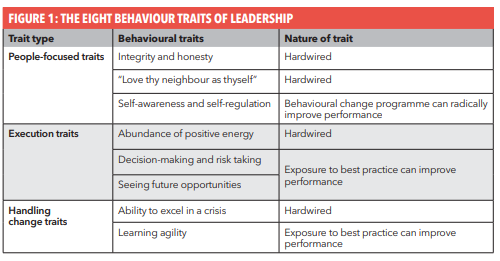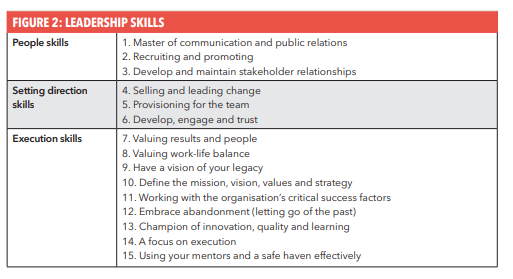David Parmenter explores the leadership attributes that management theorists believe bosses can’t succeed without.
Where does this leave my talented 40-year-old friend who works in the finance sector and has just received leadership training, but has not, to date, had any staff reporting to him? He is not as disadvantaged as one might think.
Leadership behaviour traits
Having discussed the behaviour traits in an earlier article, I want to focus on some of the skills that a winning leader needs to master. From my research into the great leaders and writers in the leadership space, I have come up with 15 leadership skills divided into three groups (see Figure 2).
In this article I want to address the people and execution skills my friend needs to master.
Figure 1: The eight behaviour traits of leadership

Figure 2: Leadership skills

Mastering communications
In his Harvard Business Review article 'What Makes a Leader?' [available in the Further reading section below], Daniel Goleman pointed out that socially skilled people see networking as vital – money in the bank to be drawn on when needed. They can quickly pull together divergent resources because they have built contacts who trust them or owe them a favour.
Leaders need to understand the importance of being a good orator, and must put time and effort into delivering a meaningful message. Special coaching and endless practice needs to be seen as an important investment instead of a chore.
Companies like McDonald’s have an employee of the month award. Surely, if four staff members have succeeded then they should all be rewarded?
Recruiting and promoting
Drucker even saw General Motors spend four hours on one promotion. CEO Alfred Sloan explained the process: “If we didn’t spend four hours on placing a man and placing him right, we’d spend 400 hours on cleaning up after our mistake – and that time I wouldn’t have.”
American author Jim Collins also emphasises the importance of taking vigilant care in the recruiting stage to maximise your chances of recruiting the right people. However, mistakes will be made, and eminent organisations quickly recognise these recruiting mistakes and help the employee move on to more appropriate pastures.
Selling and leading change
'The Three Laws of Performance' by Steve Zaffron and Dave Logan explains why so many change initiatives have failed. Zaffron and Logan specified that a person’s performance correlated with “how situations occur to them”. Furthermore, they illustrated that the organisation’s “default future” – which we as individuals just know in our bones, will happen – will be made to happen.
The key to change is to create, in the minds of an organisation’s staff, a new vision of the future. Let’s refer to this as an “invented future”. You then let them decide between the old and the new vision. If you have done the sales pitch well, reminding them of all the carnage from the current way, they will say, “hell no!” Then you ask them: “Do you vote for the status quo?”
In 1996, John Kotter proposed an eight-stage process for creating major change. These stages were outlined in another article - Kotter's theory of change management - published by the Business & Management Faculty, and are strengthened by the inclusion of Zaffron and Logan’s suggestions.
Develop, engage and trust
Companies like McDonald’s have an employee of the month award, which indicates that only one person can achieve recognition at a time. Surely, if four staff members have succeeded then they should all be rewarded? Drucker advocated that it was a leader’s duty to focus on what staff can do well, and fit tasks around them rather than criticise them for their weaknesses. Capable managers spend time with each member of their team to find out what makes them tick, how they can best lead them, and how they can serve them.
Jack Welch, former CEO at General Electric (GE), and Tom Peters have emphasised the need for the flattest management structure possible. Welch took about 10 direct reports, Peters up to 30. They both saw flatter structures as a way to avoid the silo mentality of large multinationals.
Drucker also believed a leader should ensure there is an able pool of at least three protégés to take over your position when you move on. It is a sign of failure when organisations need to seek leaders from outside. That is why Toyota and GE have always grown their own CEOs.
Finish what you start
Around the world there is a common problem facing organisations. The desire to start new projects is greater than the desire to complete existing ones. The net result is a growing list of unfinished projects. Some ways you can make a difference in this area include:
- Monitoring all late projects each week and make it career-limiting for project managers to be on the ‘late project list’ on a regular basis.
- Having a projects-in-progress summary and reviewing it at least twice a month, ensuring the projects are finished as quickly as new ones are started.
- Focusing on execution. Peter Drucker said execution was always the benchmark for evaluating a leader. Clearly leaders need to be able to say “yes”, “no” or “maybe”. As Drucker illustrated, capable leaders realise that a decision, even if wrong, is often better than no decision.
Eat a frog a day
We often dread a task because we either hate it or think it’s impossible. When you wake up in the morning, ask your subconscious: “What tasks do I not want to do today?” Your subconscious will not lie.
Swallowing your frog, or finishing your most dreaded or important assignments first, will give you a productive boost and reduce the number of items that you were worrying about.
Valuing results, people and work-life balance
Welch liked to set goals that were beyond what had been seen as possible. By raising the bar so high, staff and management were forced to find new routes to succeed, and often this was achieved. He was also aware of the dangers of setting targets and linking pay to them. He agreed with other writers that it was far better to view performance retrospectively and compare achievements against the market and other teams to ascertain the extent of achievement rather than a predetermined target.
Many senior managers and CEOs have also made decisions that have put their staff, or themselves, at risk (for example, presiding over a system where staff feel pressured to work long hours and then drive home). But great leaders – the ones you want to work for – seem to make time stand still. They somehow can smell the roses, even when under pressure. They can change the default future so we can see an alternative and be motivated to move in that direction. Insightful leaders work hard when it is needed, thereby seldom working for its own sake.
Management at Netflix and other organisations are challenging the status quo by offering staff as many holidays as they need as long as they still deliver. It should have always been about what you deliver instead of the hours you work or number of meetings you attend.
General wellbeing of staff, as well as health and fitness, are core values that good CEOs pursue vigorously while others merely pay them lip service. Several organisations have initiatives promoting fitness, for example with free step counters to encourage staff to walk during the lunch break, and take stairs instead of the lift.
Abandonment and innovation
Accomplished leaders know when to cut losses, admit they made an error of judgement, sell parts of their business and move on. The act of abandonment gives a tremendous sense of relief to the leader for it stops the past from haunting the future. It takes courage and conviction and is a skill to be cultivated.
Drucker saw innovation as being fed by his principle of abandonment. The freeing of resources can be allocated to something new.
At GE, Welch wanted innovation to be part of the culture. Workshops called ‘WorkOuts’ were held. During a ‘WorkOut’, groups discussed better practices and would brainstorm recommendations that would be given a “yes” or “no” by the manager at the end. Remaining recommendations had a maximum 30-day gestation period before a decision was made. This technique forced decision-makers to try their hand at innovation, allowing for some failure in the knowledge that it would be outweighed by success.
Furthermore, Welch understood that new ventures needed to be managed differently. He always had new ventures reporting at least two levels up the chain, and wherever possible, directly to him. They were given the freedom and support to develop.
Using your mentors and safe haven effectively
Welch observed that it was rare to find all your help in one mentor. It is far better to find a series of mentors who can help you with different decisions. Leaders will have many soul-searching moments during their careers. To cope with the lows you need to have built a safe haven for yourself – a place where you can retreat and recover.
Leaders need to nurture close family relationships and hobbies that offer relaxation and enjoyment. Without a safe haven, leaders will succumb to the sense of failure that can permeate them when all they have in their life is their business and it has gone off the rails.
To the talented friend of mine mentioned at the start, I say all these skills are attainable with a solid commitment, hunger for leadership wisdom, and some timely guidance from mentors collected along the way.
About the author
David Parmenter is a speaker and author of books including "The Leading-Edge Manager's Guide to Success" and "Key Performance Indicators"
Download PDF article
Books in the ICAEW Library collection
For information on borrowing books from the Library please contact us or see our guide to Borrowing books.
More support on business
Read our articles, eBooks, reports and guides on leadership.
Leadership hubeBooks on human resourcesCan't find what you're looking for?
The ICAEW Library can give you the right information from trustworthy, professional sources that aren't freely available online. Contact us for expert help with your enquiries and research.
-
Update History
- 12 Sep 2018 (12: 00 AM BST)
- First published
- 22 Dec 2022 (12: 00 AM GMT)
- Page updated with Further reading section, adding related resources on leadership. These provide complementary insights, case studies and perspectives on this topic. Please note that the original article from 2018 has not undergone any review or updates.
